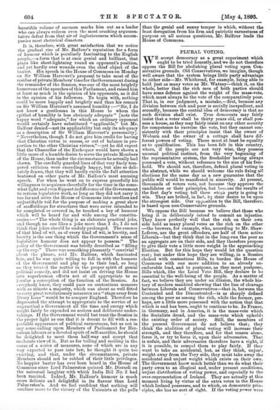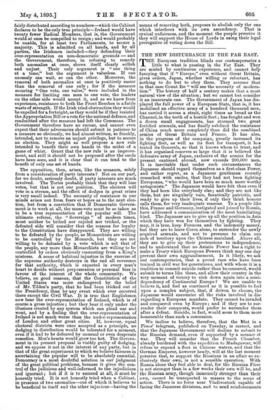PLURAL VOTING.
WE accept democracy as a great experiment which ought to be tried honestly, and we do not therefore oppose the Bill for abolishing plural voting upon Con- servative grounds. Old Conservatives, we imagine, though well aware that the system brings little party advantage to either side—Mr. Whitbread, for example, being able to hold just as many votes as Mr. Watney—think it, on the whole, better that the rich men of both parties should have some defence against the weight of the mass-vote, which must always be the vote of the comparatively poor. That is, in our judgment, a mistake,—first, because any division between rich and poor is socially inexpedient, and secondly, because the central idea of democracy is that no such division shall exist. True democrats may fairly insist that a voter shall be thirty years old, or shall pos- sess a house, as they may fairly insist on any other security for competence to exercise the vote, but they cannot con- sistently with their principles insist that the owner of Woburn and the owner• of a cottage shall have dif- ferent powers of voting. There must at least be equality as to qualification. This has been felt in this country, where, if the people are not very wise, they possess unusual political instinct, from the very beginning of the representative system, the freeholder having always possessed a vote, without reference to the size of his free- hold. We should not therefore, defend plural voting in the abstract, while we should welcome the rule fixing all elections for the same day as a new guarantee that the public will would be manifested in sincerity. At present, thousands of voters vote, not because they approve the candidates or their principles, but because the results of the first day's voting tell them eitLica party is going to win. They are bribed, in fact. ttj their desire to he upon the strongest side. Our opposition to the Bill, therefore, is based upon non-Conservative grounds.
We oppose the Bill because we believe that those who bring it in deliberately intend to commit an injustice. They know perfectly well that the rich on their own side hold as many plural votes as the rich on the other —the brewers, for example, who, according to Mr. Shaw- Lefevre, are the great offenders, are half of them active Liberals—but they think that in the long-run the poor as an aggregate are on their side, and, they therefore propose to give their vote a little more weight in the approaching Election. But for this hope they would let the question rest ; but under this hope they are willing, in a Session choked with contentious Bills, to burden the House of Commons with one more addition to an already un- .endurable load, and to postpone, as they must postpone, Bills which, like the Local Veto Bill, they declare to be essential to the well-being of the people. As a matter of fact, we believe they are under an illusion, the whole his- tory of modern mankind showing that the line of cleavage between Liberals and Conservatives—that is, between the Contented and the Discontented—is as sharply defined among the poor as among the rich, while the former, per- haps, are a little more possessed with the notion that that which is and has been, ought to continue to be. In France, in Germany, and in America, it is the mass-vote which the Socialists dread, and the mass-vote which upholdi the existing order of society. Still, the members of the present Government do not believe that; they think the abolition of plural voting will increase their strength, and they therefore, and for that reason alone, force it, or try to force it, upon their adversaries. That is unfair, and their adversaries therefore have a right, if it is possible, to compel them to play fairly. If they want to take an accidental, but as they think, unjust, weight away from the Tory side, they must take away the accidental and unjust weight which exists on their own. The Government know much better than we do what their party owes to an illogical and, under present conditions, unjust distribution of voting power, and especially to the over-representation of Ireland. They are actually at this moment living by virtue of the extra votes in the House which Ireland possesses, and, to which, on democratic prin. ciples, she has no sort of right. If the voting power were fairly distributed according to numbers—which the Cabinet declares to be the only true principle—Ireland would have twenty fewer Radical Members, that is, the Government would at once be compelled to resign ; and would probably be unable, for at least two Parliaments, to secure a majority. This is admitted on all hands, and by all parties, the Irishmen included—they defending their over-representation on non-democratic grounds — and the Government, therefore, in refusing to remedy both anomalies at once, shows itself clearly selfish and unjust. Their only argument is "one thing at a time," but the argument is valueless. If one anomaly can wait, so can the other. Moreover, the removal of both anomalies at once is positively easier than the removal of one only ; for if the measure securing "One vote, one value, were included in the measure for limiting one man to one vote, the leaders on the other side would accept it, and as we know from experience, resistance to both the Front Benches is a futile waste of strength. If the Irish tried obstruction they would be expelled for a fortnight, as they would be if they resisted the Appropriation Bill or a vote for the national defence, and readmitted after the measure had left the Commons. The Government therefore have no excuse, and cannot even expect that their adversaries should submit in patience to a measure so obviously, we had almost written, so frankly, intended, not to remove an unjust privilege, but to secure an election. They might as well propose a new rule intended to benefit their own hands in the midst of a game of whist. Grant that the new rule is an improve- ment, and still it should not be proposed after the cards have been seen, and it is clear that it can tend to the benefit of only one set of hands.
The opposition, then, arises, like the measure, solely from a consideration of party interests ? Not on our part, for we doubt, seriously doubt, if party interests are much involved. The Tories probably think that they will lose votes, but that is not our position. The electors will vote in a stream, and the effect of dodges in great crises is very small indeed. The necessity of resistance in our minds arises not from fears or hopes as to the next elec- tion, but from a conviction that if Democratic Govern- ment is to work at all, the mass-vote must be so taken as to be a true representation of the popular will. The ultimate referee, the " Sovereign " of modern times, must neither be bribed nor cajoled nor tricked, or the defeated side will consider that the reasons for loyalty to the Constitution have disappeared. They are willing to be defeated by the people, as Monarchists are willing to be controlled by the Monarch, but they are not willing to be defeated by a vote which is not that of the people, any more than Monarchists are willing to be controlled by orders obviously emanating from a King's mistress. A sense of habitual injustice in the exercise of the supreme authority destroys in the end all reverence for that authority, which is expected in every man's heart to decide without prepossession or personal bias in favour of the interest of the whole community. We believe, on good reasons, that the Constitution of the United States was more endangered by the belief of Mr. Tilden's party, that he had been tricked out of the Presidency, than by any event which ever occurred there except the Civil War. It is true that Englishmen now bear the over-representation of Ireland, which is of course a gross injustice ; but they bear it only under the illusions created by any system which can plead use and wont, and by a feeling that the over-representation of Ireland is not much worse than the under-representation of London and other great cities. If, however, equal electoral districts were once accepted as a principle, no dodging in distribution would be tolerated for a moment, even if it had to be defeated by unusual or even desperate remedies. Men's hearts would grow too hot. The Govern- ment in its present proposal is visibly guilty of dodging, and we oppose it not in the interest of any party, but in that of the great experiment to which we believe fairness in ascertaining the popular will to be absolutely essential. Democracy is a most doubtful solution in our judgment of the great political problems because it gives the con- trol of the judicious and well-informed to the injudicious and ignorant; but if it is to succeed at all, it must be honestly tried. It is not honestly tried when a Cabinet, in presence of two anomalies—one of which it believes to be beneficial to itself and the other injurious—having the means of removing both, proposes to abolish only the one which interferes with its own ascendency. That is cynical unfairness, and the moment the people perceive it they will support the House of Lords in using their legal prerogative of voting down the Bill.







































 Previous page
Previous page